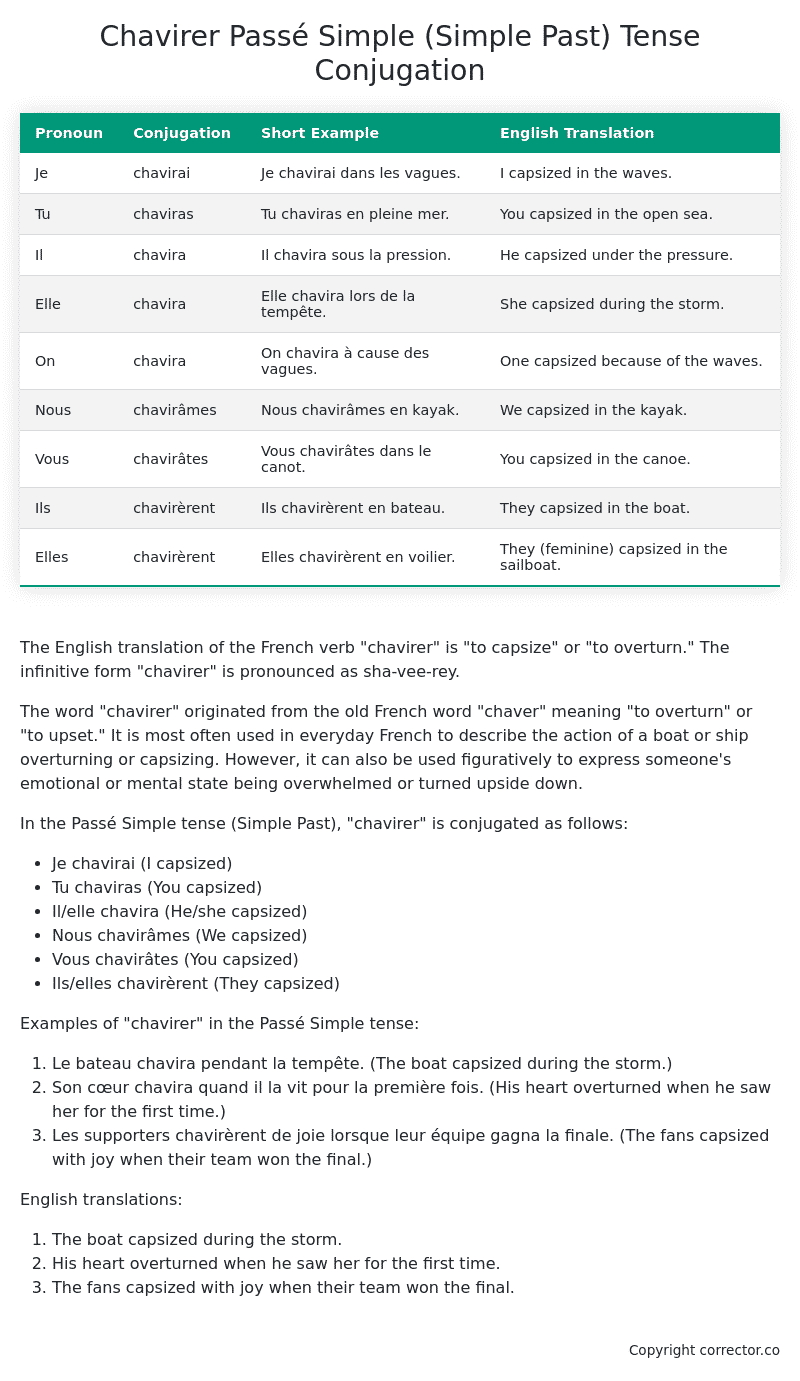Passé Simple (Simple Past) Tense Conjugation of the French Verb chavirer
Introduction to the verb chavirer
The English translation of the French verb “chavirer” is “to capsize” or “to overturn.” The infinitive form “chavirer” is pronounced as sha-vee-rey.
The word “chavirer” originated from the old French word “chaver” meaning “to overturn” or “to upset.” It is most often used in everyday French to describe the action of a boat or ship overturning or capsizing. However, it can also be used figuratively to express someone’s emotional or mental state being overwhelmed or turned upside down.
In the Passé Simple tense (Simple Past), “chavirer” is conjugated as follows:
- Je chavirai (I capsized)
- Tu chaviras (You capsized)
- Il/elle chavira (He/she capsized)
- Nous chavirâmes (We capsized)
- Vous chavirâtes (You capsized)
- Ils/elles chavirèrent (They capsized)
Examples of “chavirer” in the Passé Simple tense:
- Le bateau chavira pendant la tempête. (The boat capsized during the storm.)
- Son cœur chavira quand il la vit pour la première fois. (His heart overturned when he saw her for the first time.)
- Les supporters chavirèrent de joie lorsque leur équipe gagna la finale. (The fans capsized with joy when their team won the final.)
English translations:
- The boat capsized during the storm.
- His heart overturned when he saw her for the first time.
- The fans capsized with joy when their team won the final.
Table of the Passé Simple (Simple Past) Tense Conjugation of chavirer
| Pronoun | Conjugation | Short Example | English Translation |
|---|---|---|---|
| Je | chavirai | Je chavirai dans les vagues. | I capsized in the waves. |
| Tu | chaviras | Tu chaviras en pleine mer. | You capsized in the open sea. |
| Il | chavira | Il chavira sous la pression. | He capsized under the pressure. |
| Elle | chavira | Elle chavira lors de la tempête. | She capsized during the storm. |
| On | chavira | On chavira à cause des vagues. | One capsized because of the waves. |
| Nous | chavirâmes | Nous chavirâmes en kayak. | We capsized in the kayak. |
| Vous | chavirâtes | Vous chavirâtes dans le canot. | You capsized in the canoe. |
| Ils | chavirèrent | Ils chavirèrent en bateau. | They capsized in the boat. |
| Elles | chavirèrent | Elles chavirèrent en voilier. | They (feminine) capsized in the sailboat. |
Other Conjugations for Chavirer.
Le Present (Present Tense) Conjugation of the French Verb chavirer
Imparfait (Imperfect) Tense Conjugation of the French Verb chavirer
Passé Simple (Simple Past) Tense Conjugation of the French Verb chavirer (You’re reading it right now!)
Passé Composé (Present Perfect) Tense Conjugation of the French Verb chavirer
Futur Simple (Simple Future) Tense Conjugation of the French Verb chavirer
Futur Proche (Near Future) Tense Conjugation of the French Verb chavirer
Plus-que-parfait (Pluperfect) Tense Conjugation of the French Verb chavirer
Passé Antérieur (Past Anterior) Tense Conjugation of the French Verb chavirer
Futur Antérieur (Future Anterior) Tense Conjugation of the French Verb chavirer
Subjonctif Présent (Subjunctive Present) Tense Conjugation of the French Verb chavirer
Subjonctif Passé (Subjunctive Past) Tense Conjugation of the French Verb chavirer
Subjonctif Imparfait (Subjunctive Imperfect) Tense Conjugation of the French Verb chavirer
Subjonctif Plus-que-parfait (Subjunctive Pluperfect) Tense Conjugation of the French Verb chavirer
Conditionnel Présent (Conditional Present) Tense Conjugation of the French Verb chavirer
Conditionnel Passé (Conditional Past) Tense Conjugation of the French Verb chavirer
Conditionnel Passé II (Conditional Past II) Tense Conjugation of the French Verb chavirer
L’impératif Présent (Imperative Present) Tense Conjugation of the French Verb chavirer
L’impératif Passé (Imperative Past) Tense Conjugation of the French Verb chavirer
L’infinitif Présent (Infinitive Present) Tense Conjugation of the French Verb chavirer
L’infinitif Passé (Infinitive Past) Tense Conjugation of the French Verb chavirer
Le Participe Présent (Present Participle) Tense Conjugation of the French Verb chavirer
Le Participe Passé (Past Participle) Tense Conjugation of the French Verb chavirer
Struggling with French verbs or the language in general? Why not use our free French Grammar Checker – no registration required!
Get a FREE Download Study Sheet of this Conjugation 🔥
Simply right click the image below, click “save image” and get your free reference for the chavirer Passé Simple tense conjugation!

Chavirer – About the French Passé Simple (Simple Past) Tense
Formation
Usage
Narration
Historical Context
Interactions with other tenses
Passé Composé
Imparfait
Conditional and Subjunctive
Summary
I hope you enjoyed this article on the verb chavirer. Still in a learning mood? Check out another TOTALLY random French verb conjugation!


